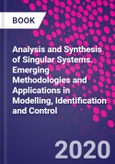Analysis and Synthesis of Singular Systems provides a base for further theoretical research and a design guide for engineering applications of singular systems. The book presents recent advances in analysis and synthesis problems, including state-feedback control, static output feedback control, filtering, dissipative control, H8 control, reliable control, sliding mode control and fuzzy control for linear singular systems and nonlinear singular systems. Less conservative and fresh novel techniques, combined with the linear matrix inequality (LMI) technique, the slack matrix method, and the reciprocally convex combination approach are applied to singular systems.
This book will be of interest to academic researchers, postgraduate and undergraduate students working in control theory and singular systems.
Please Note: This is an On Demand product, delivery may take up to 11 working days after payment has been received.
Table of Contents
1. Introduction 2. Dissipative Control and Filtering of Singular Systems 3. H8 Control with Transients for Singular Systems 4. Delay-dependent Admissibility and H8 Control of Discrete Singular Delay Systems 5. Delay-dependent Dissipativity Analysis and Synthesis of Singular Delay Systems 6. State-feedback Control for Singular Markovian Systems 7. Sliding Mode Control of Singular Stochastic Markov Jump Systems 8. Admissibility and Admissibilization for Fuzzy Singular Systems
Authors
Zhiguang Feng Professor, College of Automation, Harbin Engineering University, Harbin, China. Zhiguang Feng received the B.S. degree in automation from Qufu Normal University, Rizhao, China, in 2006, the M.S. degree in Control Science and Engineering from Harbin Institute of Technology, Harbin, China, in 2009, and the Ph.D. Degree in the Department of Mechanical Engineering, The University of Hong Kong, Hong Kong, in 2013.He was a Research Associate in the Department of Mechanical Engineering, University of Hong Kong, Hong Kong, from Oct. 2013 to Feb. 2014. From Mar. 2014 to Apr. 2015, he was a visiting fellow in the School of Computing, Engineering and Mathematics, University of Western Sydney, Australia. He was appointed with Victoria University in Australia as Postdoctoral Research Fellow within the College of Engineering and Science from Oct. 2015 to Mar. 2017. Jiangrong Li Associate Professor, College of Mathematics and Computer Science, Yan'an University, China. Jiangrong Li received the B.S degree in Mathematics from Shaanxi Normal University, Xi'an, China, in 2002, and the M.S degree in Operational Research and Cybernetics and the PhD degree in the Applied Mathematics from Xi'dian University, Xi'an, China, in 2006 and 2012, respectively. From 2017 to 2018, she was a Visiting Fellow with the College of Engineering and Science, Victoria University, Australia. Peng Shi Professor, University of Adelaide, and Victoria University, Australia. Peng Shi (M-95/SM-98/F-15) received the PhD degree in Electrical Engineering from the University of Newcastle, Australia in 1994; the PhD degree in Mathematics from the University of South Australia in 1998. He was awarded the Doctor of Science degree from the University of Glamorgan, UK in 2006, and the Doctor of Engineering degree from the University of Adelaide in 2015. Haiping Du Professor, School of Electrical, Computer and Telecommunications Engineering, Faculty of Engineering and Information Sciences, University of Wollongong, Australia. Haiping Du has more than 15-year experience on the area of modelling, dynamics and control of electrified vehicles. Dr Du received his PhD degree in mechanical design and theory from Shanghai Jiao Tong University, Shanghai, PR China, in 2002. Previously, Dr Du worked as Research Fellow in University of Technology, Sydney and as Post-Doctoral Research Associate in Imperial College London and the University of Hong Kong, respectively. Zhengyi Jiang Distinguished Professor, School of Mechanical, Materials, Mechatronic and Biomedical Engineering, Faculty of Engineering and Information Sciences, University of Wollongong, Australia. Zhengyi Jiang is currently Senior Professor and Leader of Advanced Micro Manufacturing Centre at the University of Wollongong (UOW). He has been carrying out research on rolling mechanics with significant expertise in rolling theory and technology, tribology in metal manufacturing, contact mechanics and computational mechanics in metal manufacturing, numerical simulation of metal manufacturing, advanced micro manufacturing, development of novel composites, and artificial intelligent applications in rolling process. He obtained his PhD from Northeastern University in 1996 and was promoted full professor at Northeastern University in 1998 and at UOW in 2010. He has over 620 publications (more than 430 journal articles) and 3 monographs in the area of advanced metal manufacturing. He has been awarded over 38 prizes and awards from Australia, Japan, Romania and China, including ARC Future Fellowship (FT3), Australian Research Fellowship (twice), Endeavour Australia Cheung Kong Research Fellowship and Japan Society for the Promotion of Science (JSPS) Invitation Fellowship.








